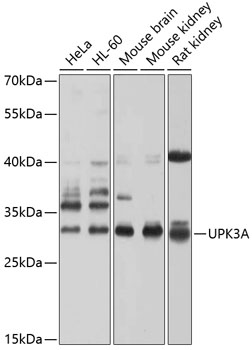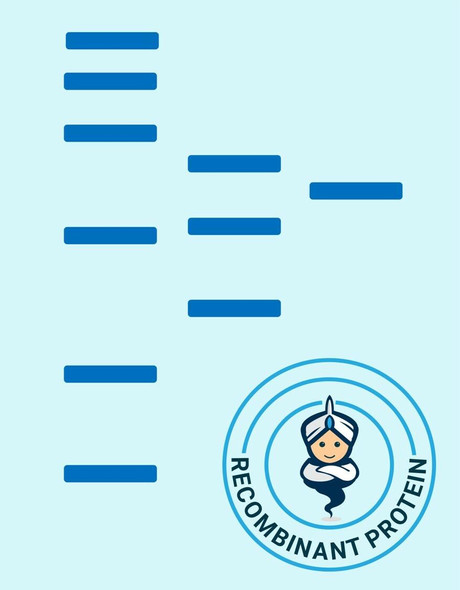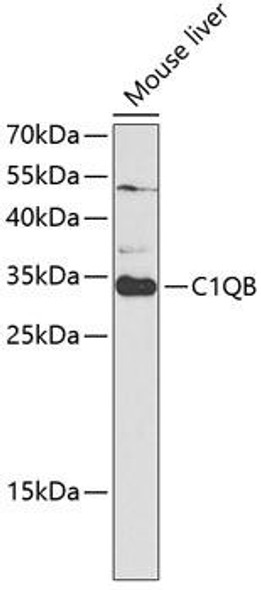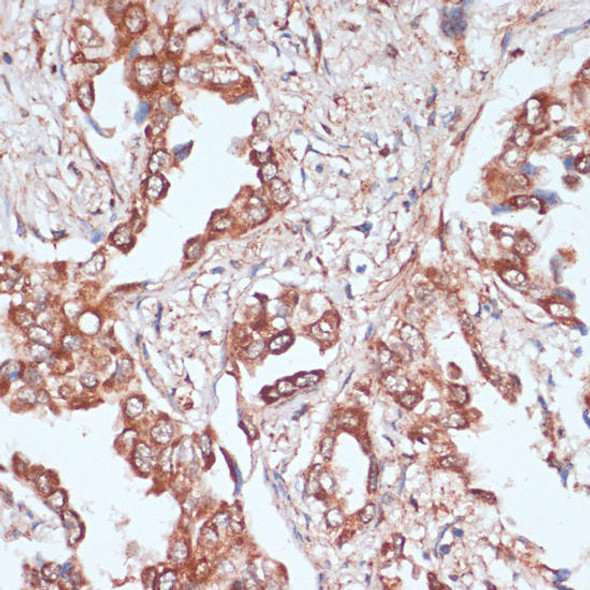Anti-UPK3A Antibody (CAB10034)
- SKU:
- CAB10034
- Product type:
- Antibody
- Reactivity:
- Human
- Mouse
- Rat
- Host Species:
- Rabbit
- Isotype:
- IgG
- Antibody Type:
- Polyclonal Antibody
- Research Area:
- Cell Biology
Frequently bought together:
Description
| Antibody Name: | Anti-UPK3A Antibody |
| Antibody SKU: | CAB10034 |
| Antibody Size: | 20uL, 50uL, 100uL |
| Application: | WB |
| Reactivity: | Human, Mouse, Rat |
| Host Species: | Rabbit |
| Immunogen: | Recombinant fusion protein containing a sequence corresponding to amino acids 19-207 of human UPK3A (NP_008884.1). |
| Application: | WB |
| Recommended Dilution: | WB 1:500 - 1:1000 |
| Reactivity: | Human, Mouse, Rat |
| Positive Samples: | HeLa, HL-60, Mouse brain, Mouse kidney, Rat kidney |
| Immunogen: | Recombinant fusion protein containing a sequence corresponding to amino acids 19-207 of human UPK3A (NP_008884.1). |
| Purification Method: | Affinity purification |
| Storage Buffer: | Store at -20°C. Avoid freeze / thaw cycles. Buffer: PBS with 0.02% sodium azide, 50% glycerol, pH7.3. |
| Isotype: | IgG |
| Sequence: | VNLQ PQLA SVTF ATNN PTLT TVAL EKPL CMFD SKEA LTGT HEVY LYVL VDSA ISRN ASVQ DSTN TPLG STFL QTEG GRTG PYKA VAFD LIPC SDLP SLDA IGDV SKAS QILN AYLV RVGA NGTC LWDP NFQG LCNA PLSA ATEY RFKY VLVN MSTG LVED QTLW SDPI RTNQ LTPY STID TWPG RRSG G |
| Gene ID: | 7380 |
| Uniprot: | O75631 |
| Cellular Location: | Endoplasmic reticulum membrane, Single-pass type I membrane protein |
| Calculated MW: | 17kDa/30kDa |
| Observed MW: | 30kDa |
| Synonyms: | UPK3A, UP3A, UPIII, UPIIIA, UPK3 |
| Background: | This gene encodes a member of the uroplakin family, a group of transmembrane proteins that form complexes on the apical surface of the bladder epithelium. Mutations in this gene may be associated with renal adysplasia. Alternatively spliced transcript variants have been described. |
| UniProt Protein Function: | UPK3A: Component of the asymmetric unit membrane (AUM); a highly specialized biomembrane elaborated by terminally differentiated urothelial cells. May play an important role in AUM-cytoskeleton interaction in terminally differentiated urothelial cells. It also contributes to the formation of urothelial glycocalyx which may play an important role in preventing bacterial adherence. Defects in UPK3A are a cause of renal adysplasia (RADYS); also known as renal agenesis or renal aplasia. Renal agenesis refers to the absence of one (unilateral) or both (bilateral) kidneys at birth. Bilateral renal agenesis belongs to a group of perinatally lethal renal diseases, including severe bilateral renal dysplasia, unilateral renal agenesis with contralateral dysplasia and severe obstructive uropathy. Belongs to the uroplakin-3 family. 2 isoforms of the human protein are produced by alternative splicing. |
| UniProt Protein Details: | Protein type:Membrane protein, integral Chromosomal Location of Human Ortholog: 22q13.31 Cellular Component: endoplasmic reticulum membrane; apical plasma membrane; integral to membrane Biological Process: epithelial cell differentiation; urinary bladder development; water transport; urea transport; cell morphogenesis; sodium ion homeostasis; kidney development; potassium ion homeostasis Disease: Renal Hypodysplasia/aplasia 1 |
| NCBI Summary: | This gene encodes a member of the uroplakin family, a group of transmembrane proteins that form complexes on the apical surface of the bladder epithelium. Mutations in this gene may be associated with renal adysplasia. Alternatively spliced transcript variants have been described.[provided by RefSeq, Nov 2009] |
| UniProt Code: | O75631 |
| NCBI GenInfo Identifier: | 266456217 |
| NCBI Gene ID: | 7380 |
| NCBI Accession: | NP_001161046.1 |
| UniProt Related Accession: | O75631 |
| Molecular Weight: | |
| NCBI Full Name: | uroplakin-3a isoform 2 |
| NCBI Synonym Full Names: | uroplakin 3A |
| NCBI Official Symbol: | UPK3A |
| NCBI Official Synonym Symbols: | UP3A; UPK3; UPIII; UPIIIA |
| NCBI Protein Information: | uroplakin-3a |
| UniProt Protein Name: | Uroplakin-3a |
| UniProt Synonym Protein Names: | Uroplakin III |
| UniProt Gene Name: | UPK3A |
| UniProt Entry Name: | UPK3A_HUMAN |









